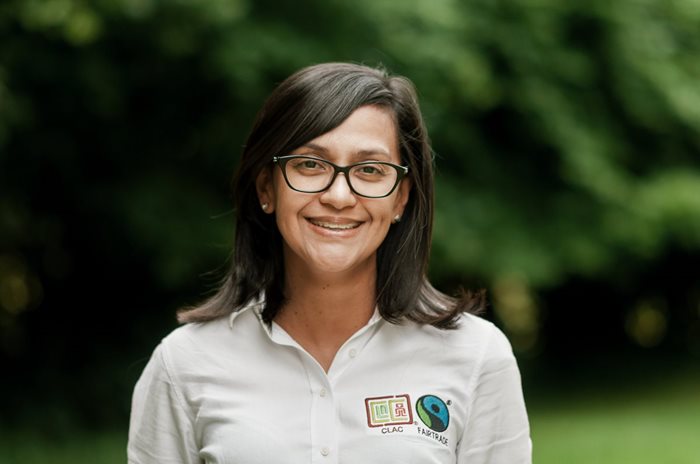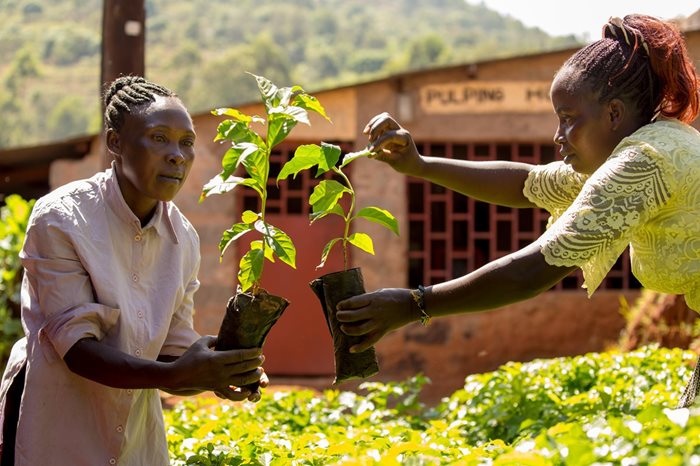In the latest issue of 5THWAVE, we caught up with Xiomara J. Paredes, Executive Director of Fairtrade’s Producer Network in Latin America and the Caribbean (CLAC) to discuss how the pioneering organisation is promoting sustainability and ethical trade across the global coffee industry
 Xiomara J. Paredes, Executive Director, CLAC | Photo credit: Fairtrade International
Xiomara J. Paredes, Executive Director, CLAC | Photo credit: Fairtrade International
Describe some of Fairtrade’s major achievements in the coffee industry over the last 30 years
Fairtrade is a people-led movement for change, working with farmers and workers to improve living standards, community welfare and our shared environment. Over the past 30 years we have achieved this by rallying a global community of millions to fight for trade justice, and by delivering specialist programmes and expertise.
Representing around 795,000 coffee farmers globally, we promote sustainable coffee farming and build stronger supply chains. This includes paying fair prices and putting more money in farmers’ pockets; protecting biodiversity and the environment; securing worker rights; improving coffee quality; ensuring women and youth’s participation and leadership; and building resilience to shocks, such as climate change and the global pandemic.
Fairtrade has the largest scope of all ethical certification schemes. In the marketplace, we work with thousands of businesses to tell their Fairtrade stories, and we are the most well-known ethical certification brand globally. Our model and impacts have been extensively independently researched, and we know that our Fairtrade Minimum Price – a safety net for producers – has enabled farmers to increase their incomes.
"Coffee producers have done the least to cause the climate crisis but bear the brunt of its impacts"
In the past 30 years, purchases of Fairtrade certified products have resulted in an estimated €1.4bn ($1.7bn) Premium (extra money on the price paid) for Fairtrade producers. This has helped fund micro-initiatives that have transformed communities globally – including by increasing access to education, business training and healthcare.
Since its inception, Fairtrade has built and invested in a unique community-based network of support for producers across the world, shaped and owned by them. Embedded in coffee-growing regions and underpinned by local expertise, these producer networks understand the local context and the challenges producers face. As a result, they are uniquely placed to support farmers to make strong, sustainable investment and business decisions.
What are some of the biggest issues facing coffee producers today and how is Fairtrade responding?
Producers across the world are facing a triple crisis: Crushingly low prices, Covid-19, and climate change. These crises are bad for farmers and their communities, but also bad for business.
Ongoing market volatility means many farmers are often forced to sell their beans below the cost of production. Without fair prices, farmers are working at a loss. This could mean they are forced to farm unsustainably or are unable to invest in quality and productivity. At its worst, this is forcing coffee farmers and their families to abandon coffee as a viable livelihood.
 Coffee farmers in Kenya have benefitted from Fairtrade’s Climate Academy | Photo credit: Fairtrade Netherlands and Fairtrade International
Coffee farmers in Kenya have benefitted from Fairtrade’s Climate Academy | Photo credit: Fairtrade Netherlands and Fairtrade International
The climate emergency poses the biggest threat to coffee producers, bringing new pests and diseases, and more extreme, erratic weather. Producers have done the least to cause the climate crisis but bear the brunt of its impacts. 2020’s hurricane season in the Americas was the worst on record. Storm Eta alone reduced Nicaraguan coffee crops by up to 30%, while Storm Iota destroyed vital infrastructure used by coffee producers in Honduras and Guatemala – a devastating blow for farmers.
All this turns the clock back on their efforts to escape poverty, at a time when Covid-19 continues to squeeze farmers’ incomes: CLAC’s own figures show that the pandemic has pushed up the cost of production by 18%.
Fairtrade partners with coffee farmers to ensure resilience against these crises. We do this in lots of different ways – whether it’s through our Fairtrade Climate Academies, which help coffee farmers access knowledge and tools to tackle climate change, through our Covid-19 Producer Relief and Resilience Funds, or through our advocating for change at national and international levels.
Thanks to these partnerships, farmers have been able to stabilise their economic situation, access new markets, improve the quality of their crop, receive a fair price, have higher living standards, protect their communities, and adapt and mitigate against the impacts of the changing climate.
What have been Starbucks’ biggest contributions to promoting ethics and sustainability in coffee over the last 50 years?
Starbucks continues to be a leading brand that has made a huge mark on the coffee sector in its 50 years. Their ability to tell the stories of coffee farmers to build better connections with consumers cannot be understated. Many companies use Starbucks to roast their private label coffee, sometimes choosing Fairtrade certified coffee, which continues to show the diversity and value that Starbucks delivers to both businesses and coffee drinkers.
Starbucks has been purchasing and labelling Fairtrade certified coffee since 2000. As one of the longest-standing Fairtrade coffee suppliers in the US and one of the largest purchasers of Fairtrade coffee globally, their purchases have delivered significant amounts of Fairtrade Premium funding to farmers.
"We need ambition, new ways of working, and collaboration across the entire coffee sector"
This year, Starbucks are due to cross the threshold of generating a total $100m in Premium via all their Fairtrade coffee sales. An average of 22.5% of Premium is distributed by Fairtrade coffee producer organisations to their members as cash each year. With that in mind, Starbucks’ sales have generated an estimated $22.5m that has gone directly into the pockets of farmers in their supply chain – an incredible amount that will go a long way towards safeguarding farmers’ futures in the face of multiple crises.
We’re excited about Starbucks’ aspiration to become a resource-positive company, giving more than it takes from the planet. We welcome their bold commitment to carbon-neutral green coffee and to conserve water usage in green coffee processing by 50% by 2030. At Fairtrade, producers tell us all the time that the climate crisis is the biggest crisis they face. To tackle the crisis effectively, we need ambition, new ways of working, and collaboration across the entire coffee sector – with brands like Starbucks leading the way.
What are your hopes for the next 50 years of progress in the global industry?
Fairtrade’s vision is of a world in which justice and sustainable development are at the heart of trade and business so that everyone, through their work, can maintain a decent and dignified livelihood. We’re committed to making this vision a reality for Fairtrade coffee farmers and businesses the world over in the next 50 years.
Critical to this is ensuring there is a viable future of coffee in the next 50 years. Already, studies show that by 2050, as much as 50% of land used for coffee farming globally may no longer be suitable. As coffee farming becomes more unpredictable and precarious, we want producers to be armed with the income, power and resources to fight the crises affecting their communities, so that the whole coffee industry can see future generations of coffee farmers thrive.
This article was first published in Issue 7 of 5THWAVE magazine.
Subscribe to 5THWAVE to receive each edition in print and digitally or sign up to our newsletter and be the first to read the latest articles and updates on World Coffee Portal research
